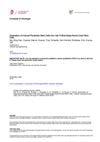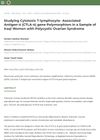 3 citations,
February 2020 in “The journal of gene medicine”
3 citations,
February 2020 in “The journal of gene medicine” A mutation in the HR gene causes a rare form of irreversible hair loss in two Kashmiri families. Whole exome sequencing is effective for finding such mutations.
3 citations,
January 2020 in “Indian Journal of Dermatology” Certain gene variations in the Vitamin D Receptor are linked to higher risk of female hair loss.
 3 citations,
January 2019 in “Jikken doubutsu ihou/Jikken doubutsu/Experimental animals/Jikken Dobutsu”
3 citations,
January 2019 in “Jikken doubutsu ihou/Jikken doubutsu/Experimental animals/Jikken Dobutsu” Pigs without the Hairless gene showed skin and thymus changes, useful for studying human hair disorders.
 3 citations,
March 2014 in “Journal of Industrial Microbiology & Biotechnology”
3 citations,
March 2014 in “Journal of Industrial Microbiology & Biotechnology” Scientists found a new gene in a bacterium that can modify an immunosuppressant drug, potentially helping to treat hair loss.
 3 citations,
February 2011 in “Journal of Biomedical Research/Journal of biomedical research”
3 citations,
February 2011 in “Journal of Biomedical Research/Journal of biomedical research” A new mutation in the KRT86 gene was found to cause the hair disorder monilethrix in a Han family.
 3 citations,
May 2023 in “Precision clinical medicine”
3 citations,
May 2023 in “Precision clinical medicine” Researchers found four genes that could help diagnose severe alopecia areata early.
 3 citations,
November 2022 in “European Journal of Human Genetics”
3 citations,
November 2022 in “European Journal of Human Genetics” New models predict male pattern baldness better than old ones but still need improvement.
 3 citations,
August 2022 in “Archives animal breeding/Archiv für Tierzucht”
3 citations,
August 2022 in “Archives animal breeding/Archiv für Tierzucht” Certain genetic changes in the KAP22-1 gene are linked to better wool quality in Egyptian sheep.
3 citations,
June 2022 in “Cells” The conclusion is that the new method makes collecting cells from plucked hair to create stem cells more efficient and less invasive.
 3 citations,
September 2019 in “PLOS ONE”
3 citations,
September 2019 in “PLOS ONE” Genetic variations affect dutasteride treatment response for male pattern hair loss.
3 citations,
March 2019 in “European Journal of Dermatology” A specific gene mutation (Y449H in K10) was found in a patient with severe skin disorder.
3 citations,
September 2017 in “Archives of dermatological research” Early diagnosis and tailored treatments are crucial for managing ichthyosis syndromes with hair abnormalities.
 3 citations,
August 2014 in “Cellular reprogramming”
3 citations,
August 2014 in “Cellular reprogramming” Hair follicle stem cells need all reprogramming factors to become pluripotent.
 3 citations,
June 2004 in “Alternative and Complementary Therapies”
3 citations,
June 2004 in “Alternative and Complementary Therapies” The document concludes that hair loss is influenced by genetics and other factors, and while treatments like finasteride can help, they have limitations and side effects.
3 citations,
October 2021 in “Indian Journal of Plastic Surgery” Pattern hair loss is mainly caused by genetics and hormones, with limited effective treatments available.
 3 citations,
May 2020 in “JAAD Case Reports”
3 citations,
May 2020 in “JAAD Case Reports” Two patients with psoriasis grew extra hair after using certain psoriasis medications.
3 citations,
March 2012 in “Journal of the Egyptian Public Health Association /Journal of the Egyptian Public Health Association” General practitioners in Qassim have satisfactory knowledge of alopecia areata but need more education to address gaps and misconceptions.
2 citations,
December 2022 in “International journal of molecular sciences” Plucked hairs can be used instead of skin biopsies to study hair traits because they contain specific cells related to hair.
 2 citations,
November 2022 in “Skin research and technology”
2 citations,
November 2022 in “Skin research and technology” 5% topical minoxidil improves hair density and quality in monilethrix patients.
 2 citations,
August 2022 in “Emergency medicine international”
2 citations,
August 2022 in “Emergency medicine international” Keloid skin disorder involves abnormal fibroblast activation and immune response, linked to a group of genes including FGF11.
2 citations,
June 2022 in “International Journal of Molecular Sciences” Lower levels of certain genes in hair cells improve hair loss treatment outcomes.
 2 citations,
March 2022 in “Research Square (Research Square)”
2 citations,
March 2022 in “Research Square (Research Square)” Seasonal changes affect gene activity linked to hair growth in Angora goats, influencing mohair quality.
2 citations,
October 2021 in “JID innovations” Uterine leiomyomas don't significantly change gene expression in the scalp of people with Central Centrifugal Cicatricial Alopecia.
2 citations,
July 2021 in “The Journal of Sexual Medicine” Gene expression differences in PFS patients suggest a potential organic cause for symptoms.
2 citations,
March 2021 in “Andrologia” Stem cell therapy affects 15 key genes in rats with diabetes-related erectile dysfunction.
 2 citations,
December 2019 in “Al-ʻulūm al-ṣaydalāniyyaẗ”
2 citations,
December 2019 in “Al-ʻulūm al-ṣaydalāniyyaẗ” The CTLA-4 gene change studied does not affect Polycystic Ovarian Syndrome in the women tested.
 2 citations,
July 2019 in “Journal of lasers in medical sciences”
2 citations,
July 2019 in “Journal of lasers in medical sciences” Laser treatment and synovial fluid can change hair follicle cells to resemble joint cells, with the changes being more significant when both treatments are used together.
 2 citations,
May 2018 in “Expert opinion on orphan drugs”
2 citations,
May 2018 in “Expert opinion on orphan drugs” Newborn screening and gene therapy are expected to improve outcomes for Omenn syndrome patients.
 2 citations,
July 2015 in “Journal of Cosmetic Dermatology”
2 citations,
July 2015 in “Journal of Cosmetic Dermatology” No clear link between specific gene and hair loss in Mexican brothers.
 2 citations,
January 2015 in “Nihon Rinshō Men'eki Gakkai kaishi”
2 citations,
January 2015 in “Nihon Rinshō Men'eki Gakkai kaishi” Scientists developed a method to regenerate salivary glands using stem cells.


















